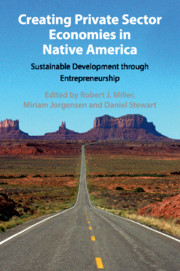 Creating Private Sector Economies in Native America
Creating Private Sector Economies in Native America Book contents
- Creating Private Sector Economies in Native America
- Creating Private Sector Economies in Native America
- Copyright page
- Contents
- Figures
- Tables
- Contributors
- Introduction
- Part I The Setting
- Part II Policy Barriers and Policy Needs
- 3 The Challenges of American Indian Land Tenure and the Vastness of Entrepreneurial Potential
- 4 Right-Sizing Use Rights: Navajo Land, Bureaucracy, and Home
- 5 Access to Credit in Indian Country: The Promise of Secured Transaction Systems in Creating Strong Economies
- 6 Tribal Economic Resurgence: Reflections from a Tribal Economic Development Practitioner
- Part III Learning from Business Scholars
- Part IV From Learning to Doing: Examples of Entrepreneurship in Indian Country
- Index
3 - The Challenges of American Indian Land Tenure and the Vastness of Entrepreneurial Potential
from Part II - Policy Barriers and Policy Needs
Published online by Cambridge University Press: 15 October 2019
- Creating Private Sector Economies in Native America
- Creating Private Sector Economies in Native America
- Copyright page
- Contents
- Figures
- Tables
- Contributors
- Introduction
- Part I The Setting
- Part II Policy Barriers and Policy Needs
- 3 The Challenges of American Indian Land Tenure and the Vastness of Entrepreneurial Potential
- 4 Right-Sizing Use Rights: Navajo Land, Bureaucracy, and Home
- 5 Access to Credit in Indian Country: The Promise of Secured Transaction Systems in Creating Strong Economies
- 6 Tribal Economic Resurgence: Reflections from a Tribal Economic Development Practitioner
- Part III Learning from Business Scholars
- Part IV From Learning to Doing: Examples of Entrepreneurship in Indian Country
- Index
Summary
This chapter explores the link between entrepreneurship and the larger project of reservation land tenure reform. Many scholars draw a connection between land-tenure design and economic development generally. This chapter provides a more detailed analysis of current reservation land tenure dynamics and the specific challenges these systems can create for private economic development. Despite this current system’s widely recognized economic and non-economic perils, successful reservation land reforms have proven incredibly difficult to achieve. In order to encourage more land-tenure innovation, this chapter flips the land reform conversation on its head. Instead of focusing solely on land reform strategies to promote economic development, this chapter explores how supporting entrepreneurship itself might, in turn, drive more experimental, innovative, and flexible land reform. Entrepreneurs tend to thrive in the kind of uncertain legal environment that is otherwise seen as a problem in Indian country, and entrepreneurs might therefore be uniquely well suited to navigate reservation legal landscapes in creative ways. Entrepreneurship can be a powerful catalyst both to improve reservation economies and to support Indigenous efforts to reclaim and sustain local land ethics and property law choices.
Keywords
- Type
- Chapter
- Information
- Creating Private Sector Economies in Native AmericaSustainable Development through Entrepreneurship, pp. 67 - 81Publisher: Cambridge University PressPrint publication year: 2019
